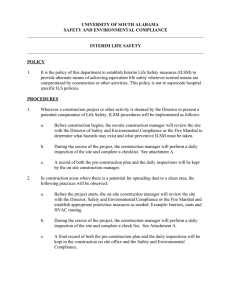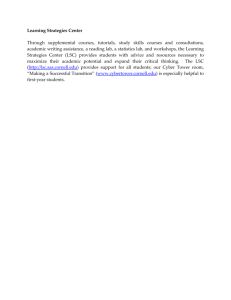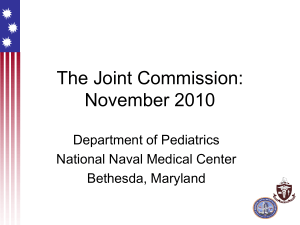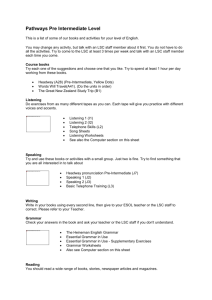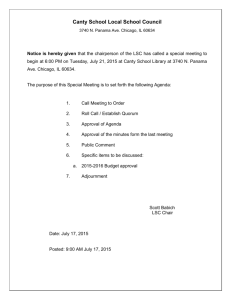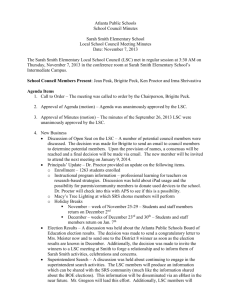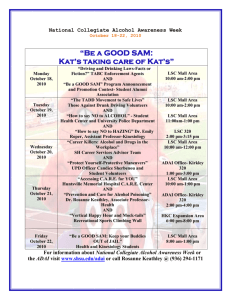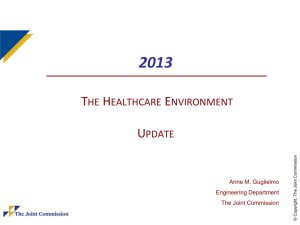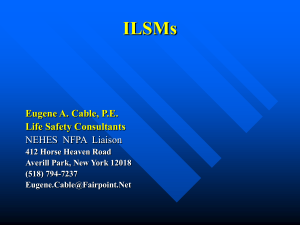top 10 most frequently scored standards
advertisement
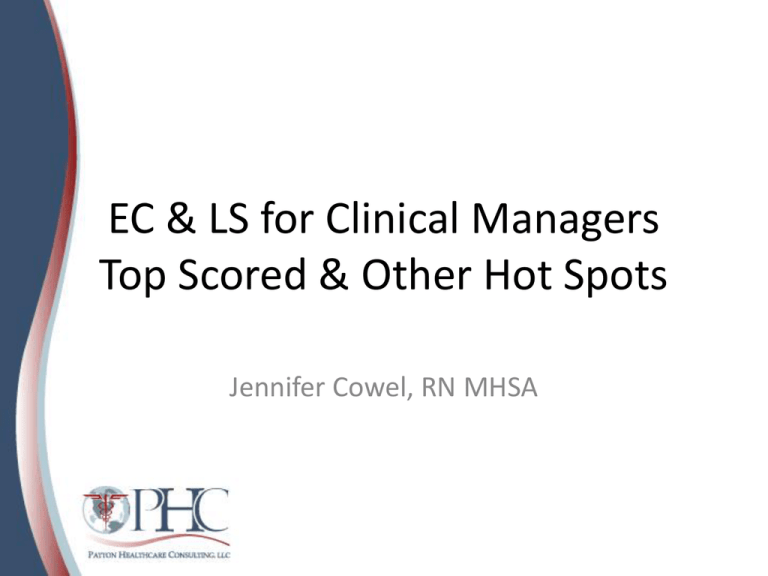
EC & LS for Clinical Managers Top Scored & Other Hot Spots Jennifer Cowel, RN MHSA Speaker Jennifer Cowel, RN MHSA TJC Experience: Former TJC Hospital Surveyor and former Director of Service Operations in Accreditation in Central Office Accreditation and regulatory compliance consultant Vice President and Principal Patton Healthcare Consulting 630-664-8401 JenCowel@PattonHC.com Learning Objectives • Why EC & LS are now top scored • Explain how the length of survey changed for LSC • Discuss three ways EC or LS can lead to an Immediate Threat during survey • Describe a short-cut to an adverse decision in LS or EC • Define the e-BBI, PFIs and ILSM • Describe the top scored EC & LS standards • Explain how clinical staff can help prepare Balance of Power Shift • In 1965 TJC was written into legislation and granted “deemed” status • In 2008 TJC was written out • In 2009 TJC applied for and was awarded deemed status by CMS, awarded for 3 years – TJC cross-walked all CoPs to standards – TJC added new requirements to meet Why CMS Drives the Bus Disparity Rate May Findings • Particularly with –Life Safety Code • An extra LSC day added to each survey starting in 2011! –Leadership (governing body) –Double ding is back! Scoring in 2010 • 4 of the top 5 scored standards were in EC or LS in 2010 • In 2009 EC was the most scored chapter • EC has 42 direct impact EPs • LS has 37 direct impact EPs LS Chapter Cheat Sheet • Based on NFPA 101-2000 LSC • Chapter Outline – Administrative (LS.01.01.01) – Interim Life Safety Measures (LS.01.02.01) • Three types of occupancy – Healthcare (LS.02.xx.xx) – Ambulatory (LS.03.xx.xx) – Residential (LS.04.xx.xx) Definition of Occupancy • CMS Changed the definition in 12/10 • No public notice from TJC about this yet • CMS definition is: – If patients receiving medical treatment or services could potentially be incapable of selfpreservation during an emergency, and are provided with sleeping accommodations or treatment and services on a 24-hour basis, the facility must be classified as a Health Care Occupancy.␣ – If patients receiving medical treatment or services could potentially be incapable of selfpreservation during an emergency or receive anesthesia services, but are not provided with sleeping accommodations or treatment and services on a 24- hour basis, the component facility must be classified as a Ambulatory Health Care Occupancy. CHANGES TO THE SURVEY IN 2011 Increase LSC Days Perspectives, Nov. 2010 • Beginning in Jan.1, 2011 • Depending on hospital size 1 to 3 days will be added – >750,000 sq feet – > 1.5 mil sq feet – More than one inpt site= add a day • Most likely, if you had a one day LSC last survey, will get a two day LSC next Increase LSC Days Perspectives, Nov. 2010 • LSC surveyor to conduct the EOC system tracer • More time for LSC review • More time for education Survey Process Preparation • Before your next survey prepare for and/or practice the following: – – – – – Day one documents – surveyor planning session Environment of Care system tracer Document Review session * Emergency Management system tracer LSC building tour * Day 1 Documents Documents needed day 1: • Environment of Care (EOC) meeting minutes past 12 months • Six EOC management plans • Annual evaluations for each plan • Safety Committee minutes • Performance Indicators (EC.04.01.01) Day 1 Documents (cont) • Statement of Condition documents (eSOC) including any Plans for Improvement (PFI) • Map of Organization (need compartment drawings for the tour) • Emergency Operating Plan, annual evaluation and HVA EOC System Tracer • • • • Was conducted by clinical surveyor Now conducted by LSS surveyor Focus: discussion oriented Discussion topic areas: chemical spills, medical waste, infant security, medical equipment, OR fire safety, Utility failures Document Review Session • “C” Element of Performance – Show me the documentation – Generally, they are looking back 12 months, but for EP’s that require less frequent testing/maintenance, they can go back three years or more • If the documentation isn’t found quickly – you are scored Time Frames Defined • Intro to EC Chapter: – Daily, weekly, monthly and quarterly are calendar references – Semi-annual is 6 months from the last occurrence +/- 20 days – Annual is 12 months +/- 30 days Now That You Know… fix it • Options for managing self identified deficiencies in LS.02.xx.xx – LS.04.xx.xx – Correct it immediately – Fix in 45 days in corrective maintenance – document it. – If it takes >45 days, create a Plan for Improvement (PFI) in your e-SOC – Consider equivalency request to TJC What is the SOC? • The Statement of Condition (SOC) is required • by TJC, parts done on Joint Commission site, includes: • Basic Building Information – eBBI • Plan for Improvement – PFI • There are other parts! What is the BBI? • The Basic Building Information eBBI: • Done online – part I of SOC • Required for each healthcare and ambulatory facilities on your eAPP • Update is needed when you add new sites to your eAPP • Look at it, part is pre-populated, other parts need your input! • Drives the length of your LSC survey What is the PFI? • The Plan for Improvement: • Done online, part IV of the SOC • Document PFIs on a regular basis when the deficiency cannot be fixed within 45 days • Includes start and end dates • Failure to meet end date plus 6 months leads to adverse decision Short Cut to Trouble • Immediate Threat to Life • Situational Decision Rule Immediate Threat to Life Immediate Threat 2 “Situational” Decision Rules 3 Direct Impact Indirect Impact •It is the Joint Commission equivalent of the “go directly to jail” card! •Joint Commission believes there is substantial noncompliance issues that have caused or could cause harm/death to patients or staff. •ITL called, your accreditation status changes to Preliminary Denial of Accreditation (PDA) overnight! Immediate Threat to Life Immediat e Threat 2 3 “Situational” Decision Rules Direct Impact Indirect Impact •EC & LS examples from Perspectives, conferences, other communications: – One single issue or a combination of observations: – Inoperable fire alarm system – Inoperable or unreliable fire pump – Inoperable Medical Gas System or alarms – Negative pressure rooms not working – Generator tests failed, not fixed Immediate Threat to Life Immediat e Threat 2 3 “Situational” Decision Rules Direct Impact Indirect Impact •EC & LS examples cont: – Utility system: main circuit breaker not tested or maintained – Raw sewage leaking from pipes in basement – No way to transmit fire alarm signal to local fire department – No emergency exit and no ILSM to compensate Situational Decision Rule for LS Immediate Threat 2 “Situational” Decision Rules 3 Direct Impact Indirect Impact • Short cut to AFS or PDA • AFS13 Defined: o The hospital did not complete corrective action identified in your PFI in a timely fashion or failed to implement ILSM In plain English: o Busted plan - Failure to implement corrective action in e-SOC review PFI o Failed ILSM Busted Plan Defined • If you do completed a PFI, you did not request and extension and you are more than 6 months past the due date, and the surveyor has “accepted” your eSOC: this is a “busted plan” • Results in adverse outcome, identified day one of survey!!! • Review your own PFIs regularly! ILSM in Brief (LS.01.02.01) • Interim Life Safety Measures (ILSM): The hospital protects occupants when LSC is not being met & during construction – Applies to LSC deficiencies – Applies to both construction and other nonconstruction repairs. – Applies to issues identified on your PFI. Ask to see these! – Many ITL could be avoided if ILSM was implemented ILSM in Brief (LS.01.02.01) • Interim Life Safety Measures (ILSM): – Hospital needs an ILSM policy – The policy must have criteria – The criteria are used to assess deficiencies and identify the need for ILSM – Ask for your criteria, ask to see the paper work showing ILSM was evaluated for construction and for PFIs Top Scored EC & LS Standards • Surveyors see these everywhere, low hanging fruit • These are seen by both the LSC surveyor and the clinical surveyors • Prevent them from seeing these at your organization and create an impression on day 1 Exits and Cluttered Corridors (LS.02.01.20 -50% in ‘10) Hospital maintains means of egress: • Blocked or locked egress doors • Corridor clutter, storage in hallways • Cart on Wheels can be plugged in but not parked for >30 minutes • Crash carts are considered “in use” • Isolation carts outside occupied room also considered “in use” 34 Exits and Cluttered Corridors, cont • LS code requires 2 exits per story • If exit is blocked, you need ILSM and an alternative exit for staff • Exit discharges to outside uneven surface or obstructed (EP8) • Exit signs – burned out, enough, proper location • “No Exit” signs posted 35 Fire Protection Features (LS.02.01.10 - 44% in ‘10) Building & fire protection features minimize the effects of fire, smoke and heat. – Fire and smoke doors labeled, correct type, close, label visible, under cut, door gaps – Penetrations are sealed with correct material – IT cables biggest offender. Consider a “bounty” system! 36 Fire Doors, cont • Inspect and maintain fire doors – Appropriate fire rating on doors and frame – Door positively latches – Door had a closure – No gaps > 1/8 inch, or undercut >3/4 inch – Resulted in ITL if multiple problems Rated Doors (cont.) • Must have legible labels on the door and jambs. Options available: – Scrap off the paint! – Have third party testing agency re- label doors – Implement ILSM, or – Request equivalency from TJC Penetrations – Seal with Fire Stop • If there are cracks or gaps then it is to be removed and repaired using current technologies • TJC does not accept the expanding foam used for insulation in any fire or smoke barrier – not UL rated & toxic Fire Protection Equipment (EC.02.03.05 – 38% in ‘10) Hospital inspects, tests & maintains fire safety equipment. Has resulted in ITL! Includes inspection, testing and maintenance of: fire alarms boxes, smoke detectors, sprinklers, portable extinguishers, magnetic release devices, tamper switches & water flow devices. If outsourced to a vendor keep the report, read the report and act on problems! Make sure reports are tied to an inventory of devices 40 Fire Extinguisher Dating (EC.02.03.05 EP 15) Month, day, year and initials of inspector required per NFPA 10-1998 They will review the tag If bar coded, they will review documentation Required monthly 41 LS -Maintain Building Features (LS.02.01.30 – 37% in ‘10) Building features are provided and maintained to protect individuals from fire and smoke – Label all Hazardous Areas (such as boiler rooms, laboratories, O2 tank supply rooms) – Limit access to hazardous areas – Education to staff with access – Smoke dampers – Corridor doors that do not latch properly – Smoke doors with gaps > 1/8 inch, >3/4 inch undercut 42 Provide/Maintain Fire Systems and Equip (LS.02.01.35 EP6) Sprinklers • 18 inch rule • Sprinkler pipes can not support other items like cables or wires • Sprinkler head clean and free of obstruction, collar flush Defibrillators: FAQ (EC.02.04.03) Q. Are defibrillators considered life support equipment? A. Yes. examples include: ventilators, heartlung bypass machines, defibrillators, AED. ① ② ③ Must be on your inventory of medical equipment Maintenance per manufacturer instructions You are scored per your policy 44 Emergency Power (EC.02.05.07 – 26%) Inspect, test, and maintain emergency power systems… battery powered lights, generators, automatic transfer switches • Has resulted in ITL decision Emergency Power, cont. • Make sure generator testing done per standard • Retest after a fix to ensure is passes eg the 4 hour generator test • Inspect, test, maintain transfer switches • If testing is outsourced to vendor keep, read and act on reports!! Leaders need to be notified when there are problems. Safe, Functional Environment (EC.02.06.01 – 20%) • Areas scored here: furnishing and equipment are in good repair, the environment meets needs of patient. • Ripped mattresses, cracked ceiling tile, mold, broken wheel chair • In behavioral health units do environmental risk assessment for suicide risks. Either fix or implement other safety interventions such as increase monitoring. Document and keep your risk assessment. ( or scored at EC.01.01.01) Medical Gas (EC.02.05.09 – 20%) • Test & inspect & maintain medical gas and vacuum per policy • Get vendor reports, fix problems noted • Gas shut off valves must be labeled with rooms they shut off. Staff must know who can shut these off and when. • Alarms must be working. Has led to ITL Safety and Security (EC.02.01.01 – 15%) Hospital manages safety and security risks • Complete risk assessments on areas of potential risk • Scored in sensitive areas such as Labor and Delivery, Pediatrics • Trace your own policies, do staff stop you or surveyor when they enter area? • See unsecured O2 scored here JKC Strategies for Success Preparing Clinical Areas • Rollout the Clinical Area Checklists – Email them out, assign, implement, collect them back, analyze compliance • • • • Involve/educate clinical & frontline staff Everyone knows who to call to get fixed Identify areas to improve, fix it, then reassess Make LS an every day expectation! Strategies for Success Do Mock Surveys • Conduct mock tracers in clinical areas • Do EOC System Tracer during your Mock survey – Use the documentation checklist – “show me where this is documented” – Look for missing dates, think medication refrigerators when doing this! Strategies for Success Mock Surveys cont. • Validate: – Inventory of fire alarms, strobes exists for each test – Generator testing documentation • • • • Tests every 20 – 40 days Checks of each transfer switch Monthly test done and documents full 30 min What was the percentage load of the generator capacity on each test – Documentation of safety inspection for each patient care unit 2x/year? Strategies for Success • Review your eSOC quarterly for updates, completion of projects • Validate that ILSM evaluations exist on paper for each PFI on the eSOC • Work with facilities staff and learn the language Strategies for Success • Make use of the PPR to document compliance – Record the name and location of each report that documents compliance – Helps during on-site survey! • When in doubt, get clarity from SIG QUESTIONS? JenCowel@PattonHC.com Please visit and bookmark www.pattonhc.com
